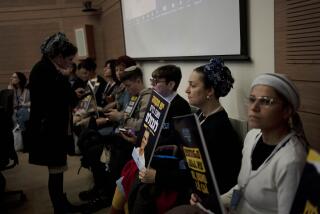Safe Passage for Rebels Possible, Fujimori Says
- Share via
LIMA, Peru — Projecting the image of a confident leader who refuses to become a figurative hostage to crisis, President Alberto Fujimori said Friday that his government is working on a potential solution in which guerrillas holding 74 captives here would be granted safe passage to another country.
“This is a possibility which naturally we are pursuing,” the Peruvian president told The Times, in his first newspaper interview since the hostage standoff began. “If such a proposal is accepted [by the rebels], we want to immediately have a nation ready to receive them.”
But, he added, “that does not necessarily mean that the [hostage takers] have accepted this.” And he declined to say whether any nation has agreed to offer temporary sanctuary to the rebels of the Tupac Amaru Revolutionary Movement, or MRTA, who took over the Japanese ambassador’s residence Dec. 17.
The terrorists have demanded safe passage to a Peruvian jungle valley for themselves and hundreds of imprisoned terrorists.
President Fujimori repeated his refusal to release jailed members of the organization and acknowledged that talks are moving “very slowly.” But he said he was encouraged by the resumption of radio conversations Friday between the government and Nestor Cerpa Cartolini, the barricaded leader of the Tupac Amaru. And referring to the government’s tight-lipped approach to the crisis, Fujimori said: “We are interested in the outcome, not so much in speeches.”
After the invasion of the Japanese ambassador’s residence, Fujimori maintained near-total silence, and the rebel leaders and opposition politicians dominated the debate. He closeted himself in the cavernous, Renaissance-inspired confines of the presidential palace in Lima’s decayed colonial downtown, where armored military vehicles stood guard Friday.
But this week, the president embarked on a counterattack, using one of the guerrillas’ favorite weapons: the media. He resumed his familiar whirlwind visits to the Lima slums, feeding on the energy of friendly crowds. He also displayed the populist streak that, curiously, complements the stern, secretive approach of an unorthodox Peruvian politician.
Fujimori, the Peruvian-born son of Japanese immigrants, won a longshot presidential bid in 1990, then angered the political establishment by shutting down Congress with military backing in 1992. He won reelection in 1995, largely on the strength of his victories against terrorism and inflation.
On Friday, the president received a reporter at a long wooden table in a high-ceilinged conference room. Military aides bustled back and forth in the doorway of an adjacent room.
The bespectacled Fujimori, 58, wore a dark suit and spoke quietly in direct, unadorned Spanish. He smiled periodically and looked crisp, despite a crisis that has lengthened the late nights that the workaholic president spends in the office, often parked in front of his computer.
“It is my custom to work hard,” Fujimori said.
The takeover of the residence amounts to a personal attack on Fujimori because of his ethnic roots and his close political ties to Japan. It has also introduced an even more personal aspect into the drama--his younger brother, Pedro, is among the hostages. But his response has been measured and cerebral.
Julio Higashi, a public relations executive and presidential ally, says that is because “he is an engineer. He is very realistic. He is very tough. But he balances toughness and prudence.”
Fujimori answered with characteristic detachment when asked how the presence of his 56-year-old brother--among the elite hostages who include Cabinet ministers, Supreme Court judges and commanders of the police and military--has affected him. “The management of the crisis is independent of any family connection,” Fujimori said. His brother is “physically well” and has communicated with his family, the president said.
Critics say last month’s attack revealed that Peru’s powerful intelligence and security forces let down their guard and were spying on the political opposition rather than on potential terrorists. Although Fujimori said further acts of terrorism are possible, he disagreed with the critics and said terrorists worldwide--not just in Peru--are able to elude detection.
“These are actions that at times escape police intelligence, but this does not mean that the MRTA has a great presence,” the president said.
Fujimori described Cerpa, his adversary on the hostage chessboard, as a “union leader who has taken up arms.” Cerpa has asked to communicate with colleagues in prison, because his forte is military operations rather than political negotiation, according to Fujimori. The government has refused to permit the contact.
In the ongoing war for media attention, the Tupac Amaru have put handwritten signs in a window of the mansion calling the president a liar for supposedly insinuating their goal is a ransom for captured Japanese executives. Fujimori pointed out that the terrorists made reference to a “war tax” from the beginning.
After more than a week in which he was not seen at the besieged mansion, Education Minister Domingo Palermo, the government’s designated negotiator, talked by radio Friday with the terrorist leader for several minutes. Fujimori said previous radio contacts broke off after the guerrillas held an impromptu news conference, disrupting negotiations up to that point.
As the standoff reached the 25-day mark, the signals were mixed. On one hand, the resumption of talks and the discussion of safe passage to another nation are hopeful signs.
On the other hand, Fujimori and Cerpa each seem intent on showing that time is on his side. But this president, who has encountered his share of crises, needs no reminders that this is a deadly business.
“Compared to the other crises . . . because human lives are at stake, this is one of the most delicate,” Fujimori said.
More to Read
Sign up for Essential California
The most important California stories and recommendations in your inbox every morning.
You may occasionally receive promotional content from the Los Angeles Times.










